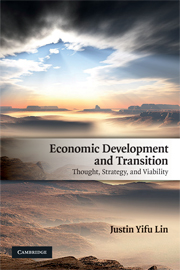Crossref Citations
This Book has been
cited by the following publications. This list is generated based on data provided by Crossref.
Lin, Justin
and
Chang, Ha‐Joon
2009.
Should Industrial Policy in Developing Countries Conform to Comparative Advantage or Defy it? A Debate Between Justin Lin and Ha‐Joon Chang.
Development Policy Review,
Vol. 27,
Issue. 5,
p.
483.
Lin, Justin Yifu
and
Sun, Xifang
2009.
Banking structure and economic growth: Evidence from China.
Frontiers of Economics in China,
Vol. 4,
Issue. 4,
p.
479.
Piveteau, Alain
and
Rougier, Éric
2010.
Émergence, l’économie du développement interpellée.
Revue de la régulation,
Vol. 7,
Issue. ,
Leftwich, Adrian
2010.
Beyond Institutions: Rethinking the Role of Leaders, Elites and Coalitions in the Institutional Formation of Developmental States and Strategies.
Forum for Development Studies,
Vol. 37,
Issue. 1,
p.
93.
Fang, Hongsheng
and
Jin, Xiangrong
2010.
ROLE OF ECONOMIC STRUCTURAL ADJUSTMENT FOR LONG-TERM ECONOMIC STABILITY IN CHINA: ESTIMATION BASED ON VARIANCE DECOMPOSITION.
Pacific Economic Review,
Vol. 15,
Issue. 5,
p.
637.
Lin, Justin Yifu
2010.
Shocks, Crises, and Their Determinants.
Middle East Development Journal,
Vol. 2,
Issue. 2,
p.
159.
HUANG, Yiping
2010.
Dissecting the China Puzzle: Asymmetric Liberalization and Cost Distortion.
Asian Economic Policy Review,
Vol. 5,
Issue. 2,
p.
281.
Lin, Justin Yifu
2011.
China and the global economy1.
China Economic Journal,
Vol. 4,
Issue. 1,
p.
1.
Lin, Justin Yifu
2011.
A Comment on Professor Robert Wade’s Rebuttal.
Global Policy,
Vol. 2,
Issue. 2,
p.
231.
Lin, Justin Yifu
2011.
Allocution d'ouverture : tirer des leçons du passé pour imaginer le futur.
Revue d'économie du développement,
Vol. Vol. 18,
Issue. 4,
p.
5.
Lin, Justin
Monga, Célestin
te Velde, Dirk Willem
Tendulkar, Suresh D.
Amsden, Alice
Amoako, K. Y.
Pack, Howard
and
Lim, Wonhyuk
2011.
DPR Debate: Growth Identification and Facilitation: The Role of the State in the Dynamics of Structural Change.
Development Policy Review,
Vol. 29,
Issue. 3,
p.
259.
2011.
An Introduction to International Economics.
p.
435.
Singh, Ajit
2011.
Comparative advantage, industrial policy and the World Bank: back to first principles.
Policy Studies,
Vol. 32,
Issue. 4,
p.
447.
Farvaque, Etienne
Mihailov, Alexander
and
Naghavi, Alireza
2011.
The Grand Experiment of Communism: Discovering the Trade-Off between Equality and Efficiency.
SSRN Electronic Journal,
Lin, Justin Yifu
2011.
Shocks, Vulnerability and Therapy.
African Development Review,
Vol. 23,
Issue. 4,
p.
371.
Farvaque, Etienne
Mihailov, Alexander
and
Naghavi, Alireza
2011.
The Grand Experiment of Communism: Discovering the Trade-Off between Equality and Efficiency.
SSRN Electronic Journal,
van Bergeijk, Peter A. G.
and
Gaasbeek, P.B.
2011.
Chinese Competition: Do We Need a New Competition Policy Regime?.
SSRN Electronic Journal,
Piveteau, Alain
and
Rougier, Éric
2011.
Le retour en trompe l'?il de la politique industrielle.
Revue Tiers Monde,
Vol. 208,
Issue. 4,
p.
177.
Lin, Justin Yifu
and
Rosenblatt, David
2012.
Shifting patterns of economic growth and rethinking development.
Journal of Economic Policy Reform,
Vol. 15,
Issue. 3,
p.
171.
Tiberghien, Yves
2012.
L'Asie et le futur du monde.
p.
199.





